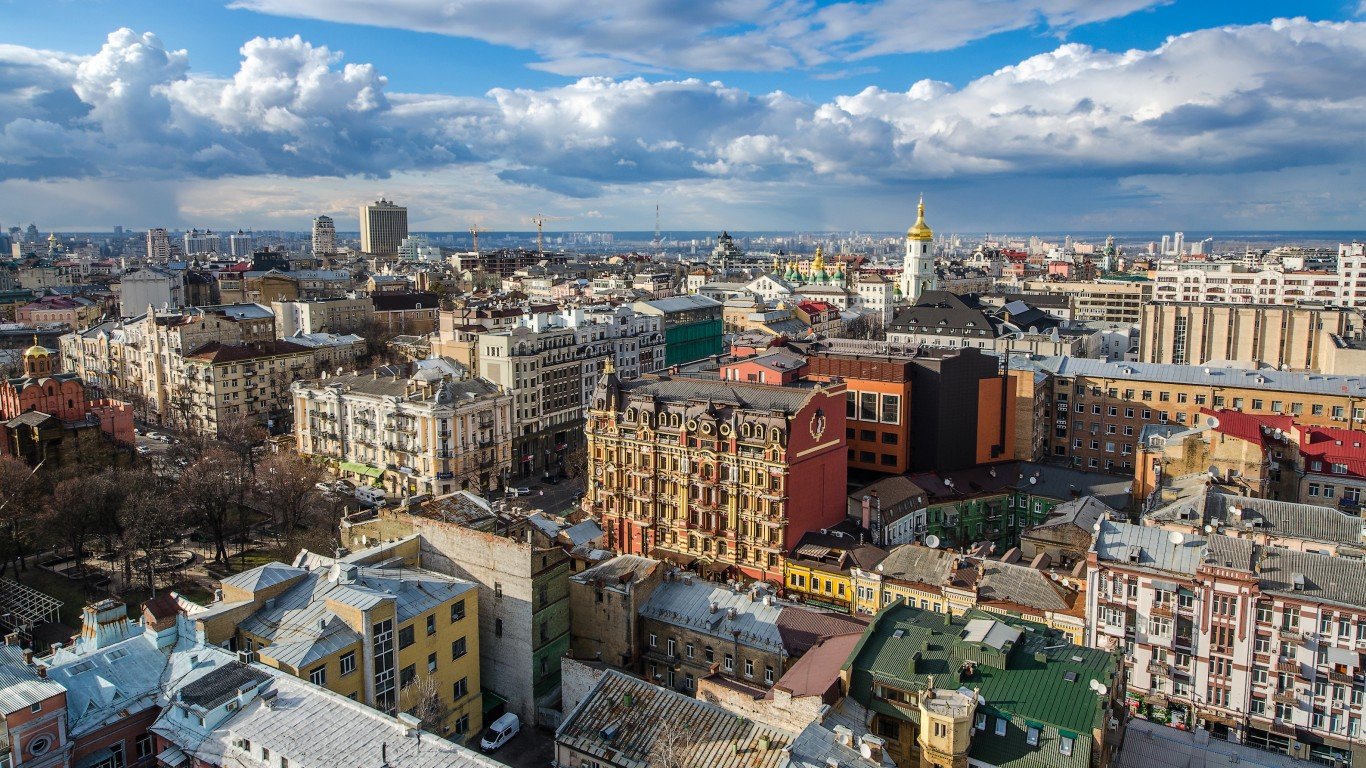
20. Ukraine
> Russian oil imports: 27.8% of all oil imports and domestic production
> Total value of Russian oil imports: $1.4 billion
> Total value of domestic oil production: $936.5 million
> UN resolution vote to condemn Russian invasion of Ukraine: In favor
Ukraine has become dependent on Russian oil imports because the nation’s oil infrastructure has decayed as the result of underinvestment, lack of modernization, corruption, and neglect. Russia, which had been a medium-sized supplier of oil to Ukraine, has become a significant exporter of oil to Ukraine.

19. Netherlands
> Russian oil imports: 28.0% of all oil imports and domestic production
> Total value of Russian oil imports: $16.0 billion
> Total value of domestic oil production: $1.4 billion
> UN resolution vote to condemn Russian invasion of Ukraine: In favor
At $16 billion, the Netherlands imports the most Russian oil of any country on the list. The Low Country is a larger refining and trading center for Europe, with large amounts of oil transiting through the port at Rotterdam.
The Netherlands has been increasing imports of oil from Russia since the beginning of the 21st century. In 2000, the share of Russian oil as a percentage of the total volume of imported crude oil was about 6%. Now it is about 28%. Dutch Prime Minister Mark Rutte said in March that EU countries are too dependent on Russian oil and should begin deleveraging from that dependency “as speedily as possible.”

18. Georgia
> Russian oil imports: 28.8% of all oil imports and domestic production
> Total value of Russian oil imports: $159.4 million
> Total value of domestic oil production: $4.8 million
> UN resolution vote to condemn Russian invasion of Ukraine: In favor
The former Soviet republic invaded by Russia in 2008 voted in favor of a U.N. resolution condemning the Russian invasion of Ukraine. Russia’s invasion of Georgia was predicated on its quest to control energy supplies exiting the Caspian Sea to European markets and beyond.
In the 1990s, President Bill Clinton backed the construction of an alternative pipeline from Baku in Azerbaijan to Tbilisi in Georgia and the Mediterranean coast in Turkey. Before this pipeline was built, Russia had controlled pipelines in the region that carried oil.

17. Turkey
> Russian oil imports: 30.0% of all oil imports and domestic production
> Total value of Russian oil imports: $3.4 billion
> Total value of domestic oil production: $1.2 billion
> UN resolution vote to condemn Russian invasion of Ukraine: In favor
Turkey, which imports $3.4 billion worth of oil from Russia, is becoming an increasingly important transit hub for oil and natural gas supplies from central Asia, Russia, and the Middle East to Europe and other markets. Turkey has few domestic sources of oil and imports a large share of its oil, most of it from Iran and Iraq. Those sources of oil have risen in recent years, and imports from Russia have declined.

16. Hungary
> Russian oil imports: 31.7% of all oil imports and domestic production
> Total value of Russian oil imports: $1.2 billion
> Total value of domestic oil production: $567.4 million
> UN resolution vote to condemn Russian invasion of Ukraine: In favor
Hungary is one of the beneficiaries of the Druzhba (Friendship) pipeline, which originates in central Russia. The pipeline moves 1 million barrels per day to refineries in Poland, Germany, Slovakia, and the Czech Republic.
At the EU summit in Brussels in March, Hungarian Prime Minister Viktor Orban backed the organization’s plans to reduce dependency on Russian energy by 2027 but did not support sanctions pertaining to the energy sector. “The Hungarian economy just cannot work without Russian fossil fuels,” he said.

 24/7 Tempo
24/7 Tempo




